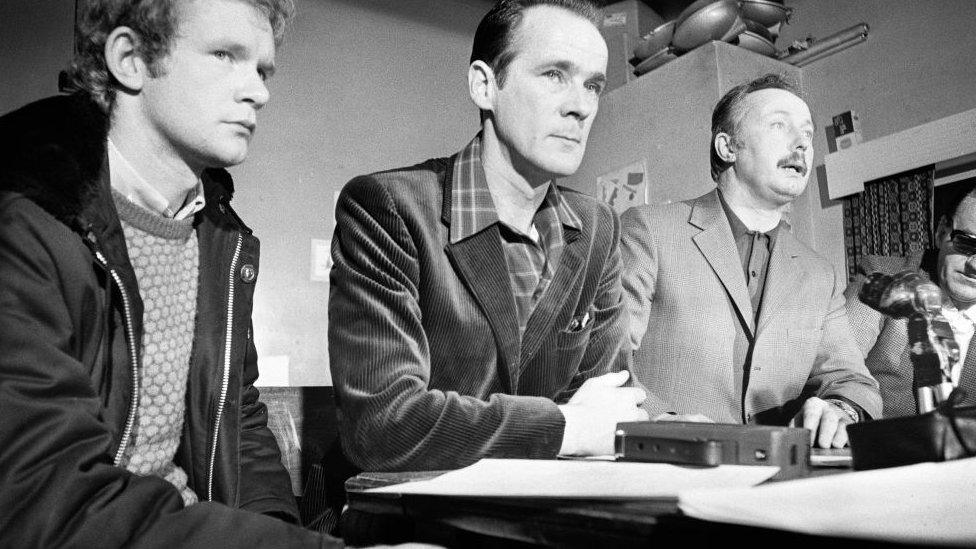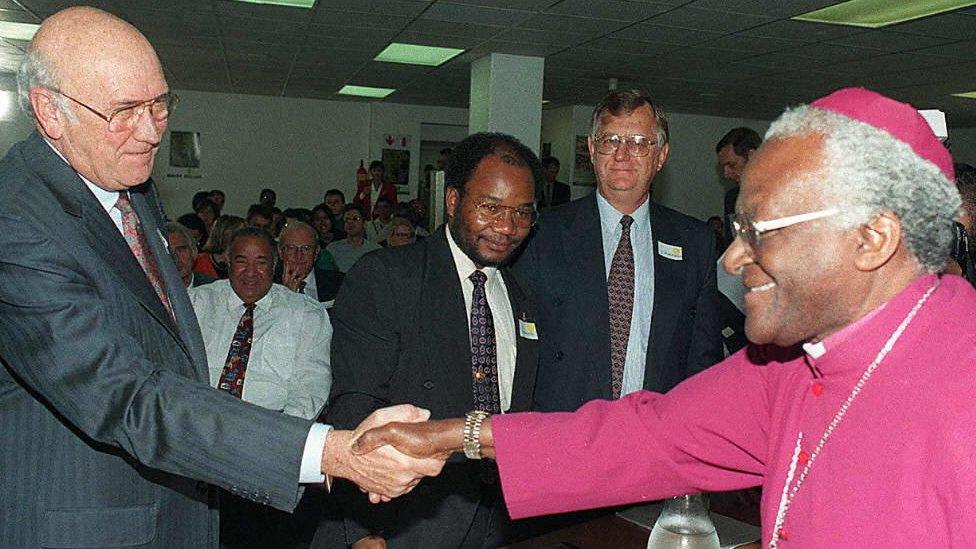Good Friday Agreement: Who wants to tell the 'truth' about NI's past?
- Published

As part of the Good Friday Agreement, paramilitary prisoners including loyalist Johnny Adair (front centre in black T-shirt) were released, but there was no condition that they spoke to a "truth commission"
It is almost 25 years since the signing of the Good Friday Agreement, the peace deal that brought an end to the Troubles - in the coming weeks, BBC News NI across our news website, TV and radio, will be looking back at the historic deal, speaking to the key players and reflecting on how the agreement continues to shape Northern Ireland.
Take the legacy of the Troubles - an issue that dominates hearts and minds in 2023. A controversial UK government bill going through Westminster is offering conditional amnesties to perpetrators who co-operate with a new information recovery body - a kind of truth recovery process, not unlike the Truth and Reconciliation Commission set up in post-Apartheid South Africa.
But, as former BBC security correspondent Brian Rowan finds out, there are big questions over who would be willing to tell the truth - and what the truth is - decades on.

Can the conflict really be over when we live in a present that is often still dominated by the past?
Who really wants a truth process that will excavate the years of the Troubles in search of answers to the most difficult of questions?
Does the IRA really want to talk about how bodies were disappeared, and the leaders and the orders that allowed that to happen?
Do the loyalists want to talk about "butcher gangs"?
What about the so-called dirty war and all of the associated questions about collusion? On this, there are many questions for the military, the special branch and the Security Service (MI5).
For 15 or so of the 25 years since the Good Friday Agreement, we have been talking about the past and avoiding it - in many senses talking to a brick wall; about truth and information, themes and patterns, commissions for this and that.
Reconciliation, remembering, forgetting, drawing lines, throwing bricks in the political glass houses - and still we are no closer to "truth" or to an agreed process that might begin to make things better.
There have been numerous consultations, negotiations, agreements and disagreements - but what about putting the direct questions to those who would have many of the answers?
Who would participate in such a process?

Decommissioning of weapons was a key part of the peace process, but it was about handing over guns rather than telling the "truth"
It's a question I asked former Royal Ulster Constabulary (RUC) Chief Constable Sir Ronnie Flanagan, loyalist leader Jackie McDonald and Jake Mac Siacais, who spent years on the IRA wings in the Maze prison.
"Of course, I'd participate in a truth process," Flanagan responded. "Absolutely. Why would I not?"
The others would not.
And this is the missing piece in this conversation; not knowing who will step forward and who will walk away.
In thinking about structures and commissions and time frames, the cart is in front of the horse - things in the wrong order.
What is the point of building a house if no-one will buy it?

Martin McGuinness (left) pictured when he was a Provisional IRA leader in Londonderry in 1972
I once thought out loudly about how much more we would learn about and understand the conflict years had we been able to create a process, in which people like Flanagan and the republican leader Martin McGuinness would have been able to speak frankly.
It is too late for that now - McGuinness, who sat at the very top of the IRA structure and went on to become deputy first minister in the Northern Ireland Executive, died in 2017.
There are many with answers who are no longer with us. Much of the critical memory and knowing that relates to the conflict period has been lost.
So, the question is, how to achieve what is possible with those who are still here.

South Africa set up a Truth and Reconciliation Commission. Here its head Archbishop Desmond Tutu (right) shakes hands with former President FW de Klerk
Sir Ronnie recalls spending time with a member of the truth commission in South Africa. He was told that "we could never have succeeded without Nelson Mandela... I don't know if you have a Nelson Mandela in Northern Ireland".
Do we, I asked?
"We have people who aspire to peace and who have done a great job. Some no longer with us," he replied.
But, no, he didn't think we did have one - though, he added, there are not many countries who could say they have a Nelson Mandela.
The main advice from South Africa, Flanagan said, was of knowing what you are trying to achieve - whether that be prosecutions, truth-recovery, healing, reconciliation - and then work backwards from there.
Good Friday Agreement: 'A Nelson Mandela in Northern Ireland?'
Jake Mac Siacais and Jackie McDonald are blunt about their prospects of participating in a truth recovery process.
"Let's be very frank about it," Mac Siacais said.
"The idea that the IRA as a corporate body is going to step up and go into a process, I don't think is a runner... I don't think it's going to happen."
Good Friday Agreement: No appetite for a truth process, says ex-IRA man
McDonald spoke of people wanting to hear the truth, but asked the question: "Do they want to tell the truth?"
And, thinking back to the Troubles years, he had this to say: "Was the war worth the peace?
"The war wasn't worth anything , and the peace - the peace is a blessing."
Good Friday Agreement: Loyalist Jackie McDonald on NI's approach to the past
Mac Siacais also believes those wars are over: "I think anyone who deludes themselves into believing that there is an efficacy in armed struggle in 2023 is either a headcase or someone who has other motives."
Good Friday Agreement: Sir Ronnie Flanagan 'happy to talk to truth commission'
When we walk the ways of the peace, and of the the past 25 years, we can see what is better and we know what still needs to be done.
The peace has been a fight, but nowhere near as hard as burying the dead of the conflict years.
In the brokenness of our politics, there is louder talk about a "New Ireland" - but that won't be built on an old past and on graves that still ask for answers.
For 25 years we have been making an imperfect peace - during the next 25, might we find the way to answer the past with its many questions?

Attempts to deal with the past
The UK government's legacy bill is just the latest in a long line of attempts to deal with the bloody and traumatising legacy of the Troubles and the more than 1,000 unsolved killings from that time.
2009 - Eames-Bradley report: Includes 30 recommendations on legacy issues, including a one-off £12,000 payment for the families of all those killed during the Troubles. That idea is heavily criticised as payments would be also be given to families of paramilitaries who died. The proposals are never implemented.
2013 - Haass-O'Sullivan: Former US diplomat Richard Haass and Prof Meghan O'Sullivan publish a proposed agreement following a series of talks with Northern Ireland's main parties, aimed at solving contentious issues - including the legacy of the past. Proposals include the formation of a Historical Investigative Unit (HIU) to take forward legacy cases and an archive to preserve first-person accounts of the Troubles. Talks end without agreement.
2014 - Stormont House Agreement: This broad deal, a year on from the Haass talks dealt with many of the same issues - it proposes going ahead with the HIU, an oral history archive and the Independent Commission on Information Retrieval (ICIR), a body that will allow people to get information on Troubles-related deaths. The agreement soon became a disagreement?
2015 - Fresh Start Deal: The Fresh Start deal agrees to many of the proposals from Stormont House - but not on legacy issues, meaning the proposed new agencies, such as the HIU, do not go forward.
2022 - NI Legacy Bill: UK government introduces legislation that aims to draw a line under the conflict. It's most controversial element involves immunity from prosecution for those who co-operate with a new information recovery body, the Independent Commission for Reconciliation and Information Recovery (ICRIR). Victims groups and NI political parties oppose the bill, which is going through the House of Lords.


TROUBLES AND PEACE: A story of history and hope - 25 years since the Good Friday Agreement was signed.
ENDGAME IN IRELAND: The inside story of the peace process in Northern Ireland.

Related topics
- Published20 February 2023

- Published3 April 2023
